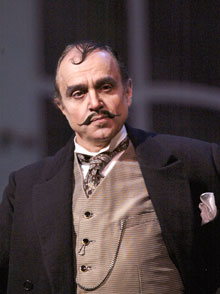  |
| HOME | THIS ISSUE | CALENDAR | GRANTS | BACK ISSUES | < BACK | NEXT > |
Students immersed in opera through partnership with the Metby Karen Singer - April 30, 2007 | ||||||
| During a recent master class at the Metropolitan Opera, veteran character actor Anthony Laciura was urging UConn graduate student Jennifer Darius to sing with more emotion.
Darius’ sumptuous soprano soared further, while singing “Vissi D’Arte,” an aria from Tosca. “That’s good. That’s the idea,” Laciura said, beaming with approval. The several dozen UConn music students and faculty members responded with a vigorous round of applause. The master class participants and observers were among a group of 146 UConn students at the Met on April 17 for what has become an annual spring pilgrimage to the opera house, which has an educational partnership with the University’s School of Fine Arts. The students observed a full dress rehearsal of Puccini’s Il Trittico and attended an evening performance of Handel’s Giulio Cesare. The UConn/Met collaboration, which began in 2002, is flourishing, says David Woods, dean of fine arts, who accompanied the group on the field trip. Woods says he developed the concept of a collaborative educational program with the Metropolitan Opera in the late 1990s, when he was dean of the Indiana University School of Music. But the idea did not take off at that time. He revived the proposal after becoming dean of the UConn School of Fine Arts in 2000, and it gained momentum with the support of Raymond and Beverly Sackler, major donors to the University. Beverly Sackler is a member of the Metropolitan Opera board. In August 2001, Woods says, Volpe called from Japan to say, “We’re going to do it.” As part of the collaboration, students attend dress rehearsals and performances and go on backstage tours at the opera house. Singers and coaches from the Met visit UConn to work on scenes and conduct master classes; and UConn professors, including those specializing in design and illustration, periodically take small groups of students to the Met. Technical and administrative internships are also part of the program. Nine UConn students have become Met interns since 2002, according to Hilary Ley, associate director of operations at the opera house. Looking ahead, Woods wants to expand the partnership by creating a summer program for the Met at UConn – a concept contained in his original proposal. He envisions the program developing and improving the skills of voice teachers from around the country. “What an impact we could make on opera,” he says. In another development, Woods notes that the Met is expanding its opera simulcasts beyond movie theaters to other venues. UConn will be the first university among those sites. Stewart Pearce, the Metropolitan Opera’s assistant manager of operations, says the collaboration with UConn “allows the Met to further its mission of opera education, outreach, and professional development. We hope that UConn views the program as a window into the workings of the opera field, and that it helps crystallize the dreams and goals of the students.”
Woods sees the Met collaboration as an enhancement to UConn’s fine arts curriculum. “It’s extremely important, early on, that students walk in the Met and go backstage,” he says. Constance Rock, an assistant professor of music who specializes in opera, says she is surprised how many of the students have never been to the Met before. Eighteen-year-old freshman Caitlin Yates, who is studying art and psychology, had previously seen ballet performances in New York, but the April 17 trip to the Met was the first time she had been to an opera. She said she enjoyed the experience, adding that Il Trittico was well acted and the scenery was “gorgeous.” Another freshman and first-time visitor to the Met, trumpet player John Mathieu, said he would love to perform in the opera house, with its “world-class and acoustically accurate” hall. After the master class, Darius, the soprano, said she appreciated Laciura’s efforts to improve her role as Tosca. “I do feel that I get very into the character who’s in a battle for her life,” she said. Laciura says he relishes his role as teacher. After 25 years of performing, he’s looking for opportunities to give back, he said. While the master class was underway, another group of students sat cross-legged on the lobby floor at the Met, listening to stage director Sharon Thomas and company director Stephen Brown talk about lighting, design, and other behind-the-scenes elements of opera productions. Thomas said Il Trittico, with its three one-act operas, has the biggest set the Met has ever had, requiring 27 semi tractor-trailers to transport it to the theater. She said work on the production began three years ago but went into high gear last year. Students were surprised to learn that costumes are the most expensive part of an opera because most are double-cast, requiring twice the amount of custom-tailored garb. UConn intern Jerod Schomer, who’s currently working in the technical department of the Met, told the students he’s learning a lot through observation. He is also producing a handbook for the technical department, and printing full-sized drawings for the forest for Macbeth. At the end of the session, Woods spoke about the UConn/Met collaboration, pointing out that several former interns have been hired to work there. Daniel Jeanette, for example, an administrative intern in spring 2005, is now an administrative assistant to Metropolitan Opera general manager Peter Gelb. John Froelich, the first UConn intern, was hired by the Met after a stint in the technical department in spring 2002. He recently left for a job with the English National Opera. Said Woods, “See what can happen.” |
| ADVANCE HOME UCONN HOME |


